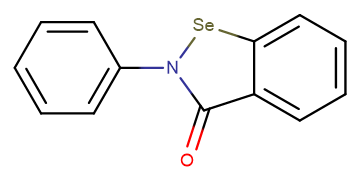
Ebselen
CAS No. 60940-34-3
Ebselen( SPI-1005 | SPI1005 | SPI 1005 | Ebselen | PZ 51 | PZ51 | PZ-51 | DR3305 | DR 3305 | DR-3305 )
Catalog No. M15289 CAS No. 60940-34-3
Ebselen is a mimic of glutathione peroxidase and can also react with peroxynitrite.
Purity : >98% (HPLC)
 COA
COA
 Datasheet
Datasheet
 HNMR
HNMR
 HPLC
HPLC
 MSDS
MSDS
 Handing Instructions
Handing Instructions
| Size | Price / USD | Stock | Quantity |
| 5MG | 38 | In Stock |


|
| 10MG | 52 | In Stock |


|
| 25MG | 77 | In Stock |


|
| 50MG | 104 | In Stock |


|
| 100MG | 156 | In Stock |


|
| 200MG | 233 | In Stock |


|
| 500MG | Get Quote | In Stock |


|
| 1G | Get Quote | In Stock |


|
Biological Information
-
Product NameEbselen
-
NoteResearch use only, not for human use.
-
Brief DescriptionEbselen is a mimic of glutathione peroxidase and can also react with peroxynitrite.
-
DescriptionEbselen is a mimic of glutathione peroxidase and can also react with peroxynitrite. It is being investigated as a possible treatment for reperfusion injury and stroke, hearing loss and tinnitus, and bipolar disorder.(In Vitro):Ebselen (SPI-1005; 0.4-100 μM; 20-24 hours) shows strong antiviral effects at a concentration of 10 μM treatment in COVID-19 virus infected Vero cells. Ebsele covalently binds to C145 of the catalytic dyad in COVID-19 virus Mpro.Ebselen inhibits early viral postentry events of the HIV-1 life cycle by impairing the incoming capsid uncoating process.Ebselen permeates the blood-brain barrier and inhibits endogenous inositol monophosphatase in mouse brain. Ebselen inhibits inositol monophosphatase (IMPase).Ebselen inhibits QSOX1 enzymatic activity and suppresses invasion of pancreatic, renal cancer cell lines.(In Vivo):Ebselen (5, 10 mg/kg; IP) decreases 5-HT2 agonist-induced head twitches in a dose-dependent manner.
-
In VitroEbselen (SPI-1005; 0.4-100 μM; 20-24 hours) shows strong antiviral effects at a concentration of 10 μM treatment in COVID-19 virus infected Vero cells. Ebsele covalently binds to C145 of the catalytic dyad in COVID-19 virus Mpro.Ebselen inhibits early viral postentry events of the HIV-1 life cycle by impairing the incoming capsid uncoating process. Ebselen permeates the blood-brain barrier and inhibits endogenous inositol monophosphatase in mouse brain. Ebselen inhibits inositol monophosphatase (IMPase). Ebselen inhibits QSOX1 enzymatic activity and suppresses invasion of pancreatic, renal cancer cell lines. RT-PCR Cell Line:COVID-19 virus infected Vero cells Concentration: 0.4, 1.2, 3.7, 11.1, 33.3, 100 μM Incubation Time:20-24 hours Result:Showed strong antiviral effects at a concentration of 10 μM treatment.
-
In VivoEbselen (5, 10 mg/kg; IP) decreases 5-HT2 agonist-induced head twitches in a dose-dependent manner. Animal Model:20-25 g 10-12 week old male C57Bl6 mice Dosage:5, 10 mg/kg Administration:IP Result:Decreased 5-HT2 agonist-induced head twitches in a dose-dependent manner.
-
SynonymsSPI-1005 | SPI1005 | SPI 1005 | Ebselen | PZ 51 | PZ51 | PZ-51 | DR3305 | DR 3305 | DR-3305
-
PathwayChromatin/Epigenetic
-
TargetCOX
-
RecptorCOX
-
Research AreaInflammation/Immunology
-
Indication——
Chemical Information
-
CAS Number60940-34-3
-
Formula Weight274.18
-
Molecular FormulaC13H9NOSe
-
Purity>98% (HPLC)
-
SolubilityWater: 10 mM
-
SMILESO=C1N(C2=CC=CC=C2)[Se]C3=CC=CC=C13
-
Chemical Name2-phenylbenzo[d][1,2]selenazol-3(2H)-one
Shipping & Storage Information
-
Storage(-20℃)
-
ShippingWith Ice Pack
-
Stability≥ 2 years
Reference
1.Schewe T. Gen Pharmacol, 2009, 26 (6): 1153–69.
molnova catalog



related products
-
Tolmetin
Tolmetin is a Nonsteroidal Anti-inflammatory Drug. The mechanism of action of tolmetin is as a Cyclooxygenase Inhibitor.
-
Cinchophen
Cinchophen is an analgesic drug that is frequently used to treat gout.
-
Minoxidil
Minoxidil(U 10858) is an antihypertensive vasodilator medication.



 Cart
Cart
 sales@molnova.com
sales@molnova.com


